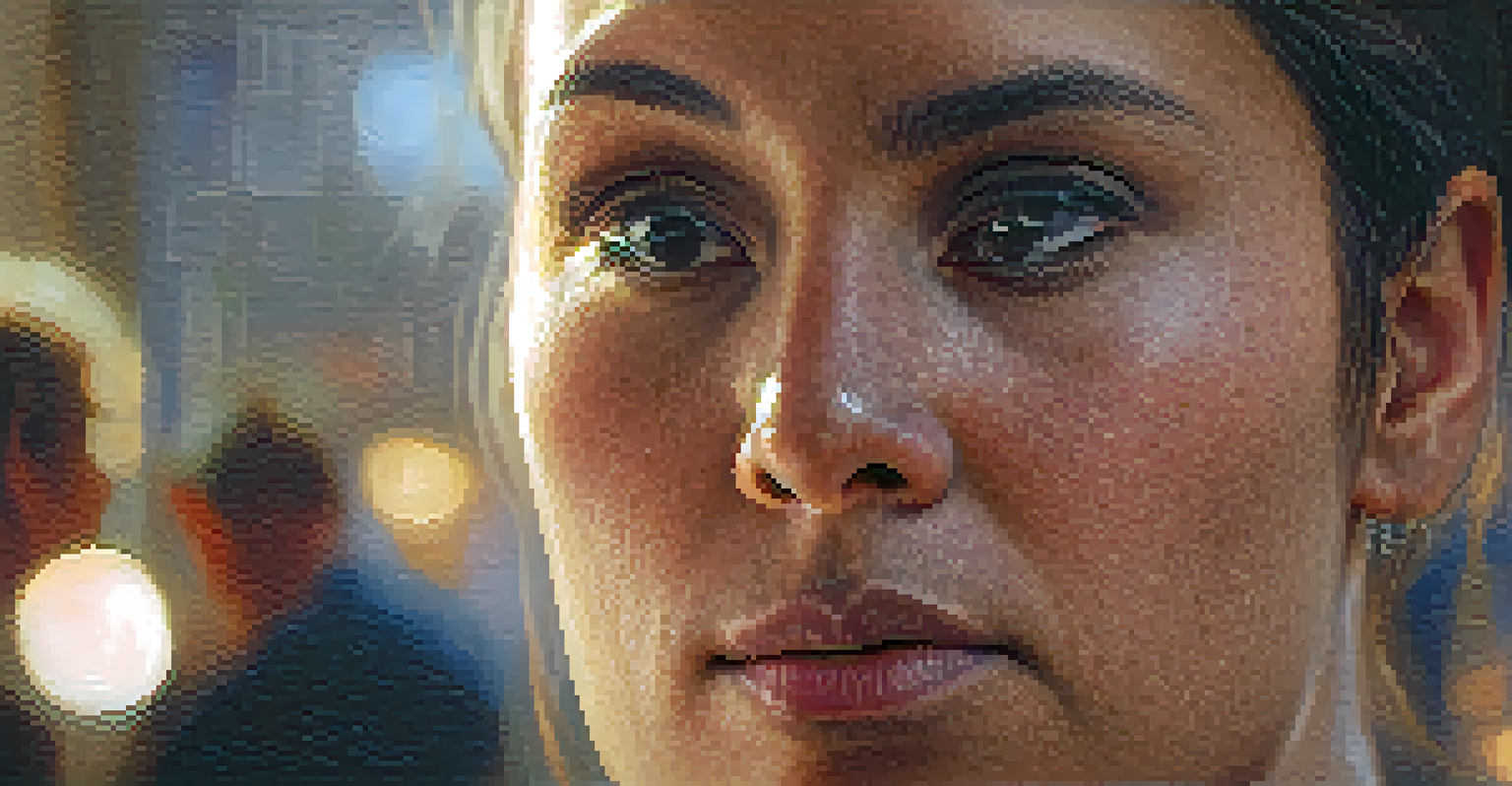The Impact of Film on Public Health Campaigns

The Power of Visual Storytelling in Health Campaigns
Visual storytelling has a remarkable ability to engage audiences, making complex health issues relatable. Films can evoke emotions and create memorable narratives that resonate with viewers, leading to a deeper understanding of public health topics. For instance, documentaries on smoking cessation have shown how personal stories can motivate individuals to quit, effectively changing behaviors.
Storytelling is the most powerful way to put ideas into the world today.
By presenting real-life experiences, films provide a human touch that statistics alone cannot achieve. This emotional connection often encourages viewers to take action, whether it's adopting healthier habits or supporting relevant initiatives. The impact is amplified when these stories are shared widely, reaching a broader audience and sparking conversations.
In essence, visual narratives in health campaigns transform abstract concepts into concrete experiences, making the information accessible. This approach not only educates but also inspires, demonstrating the profound influence of cinema on public health awareness.
The Influence of Documentaries on Health Awareness
Documentaries serve as powerful tools for raising awareness about public health issues. They delve deep into topics, presenting facts and personal stories that engage viewers on multiple levels. Films like 'Super Size Me' have changed perceptions about fast food and obesity, illustrating the risks in an impactful way.

The effectiveness of documentaries lies in their ability to blend education with entertainment, ensuring the message sticks. Viewers often find themselves more informed and motivated to change their behaviors after watching these films. This combination of storytelling and factual evidence creates a compelling case for action.
Visual Storytelling Engages Audiences
Films create emotional connections that help audiences understand and relate to complex health issues.
Moreover, documentaries can spark discussions and mobilize communities around health initiatives. By showcasing the consequences of health-related choices, they encourage audiences to reflect on their habits and make informed decisions.
The Role of Fictional Films in Health Messaging
Fictional films also play a significant role in shaping public perceptions of health issues. Through relatable characters and engaging plots, they can highlight the importance of health awareness and prevention. Movies like 'Philadelphia' have shed light on HIV/AIDS, humanizing the discussion and reducing stigma.
The best way to predict the future is to create it.
These films often tackle complex themes, allowing audiences to connect emotionally with characters facing health challenges. This connection can lead to increased empathy and understanding, ultimately fostering a supportive environment for those affected by similar issues. When viewers see these narratives unfold, they are more likely to reflect on their health choices.
In many ways, fictional films can serve as catalysts for change by promoting discussions around sensitive health topics. They create a safe space for dialogue, encouraging viewers to share their thoughts and experiences related to the issues presented.
Creating Campaigns: Collaborations Between Filmmakers and Health Experts
To maximize the impact of health campaigns, collaborations between filmmakers and health experts have become increasingly common. These partnerships ensure that the information presented is accurate, relevant, and resonates with the target audience. By working together, both parties can create compelling content that educates and inspires.
For example, public health organizations often consult with filmmakers to ensure their messages align with current health guidelines and research. This collaboration not only enhances the credibility of the film but also amplifies its reach and effectiveness. When health experts guide the narrative, the result is a richer and more informative viewing experience.
Documentaries Raise Health Awareness
By blending education with entertainment, documentaries effectively inform viewers and motivate behavioral changes.
Additionally, these partnerships can lead to innovative marketing strategies that engage audiences across multiple platforms. By combining creative storytelling with factual information, these campaigns can effectively advocate for public health initiatives.
Social Media: Amplifying the Reach of Health Films
In today's digital age, social media plays a crucial role in amplifying the reach of health films. Platforms like Instagram, Twitter, and Facebook allow filmmakers and health organizations to share their messages with a wider audience. Short clips, trailers, and behind-the-scenes content can generate interest and drive viewers to watch the full film.
Moreover, social media enables viewers to engage directly with the content and share their thoughts. This interaction creates a community of advocates who spread awareness and encourage others to participate in health initiatives. The viral nature of social media can lead to significant momentum for public health campaigns.
Ultimately, leveraging social media enhances the impact of health films, turning them into powerful tools for change. By encouraging dialogue and sharing personal stories, these platforms help sustain conversations around important health topics.
Case Studies: Successful Health Campaigns Using Film
Several successful health campaigns have effectively utilized film to achieve their goals. For instance, the 'Truth' campaign against smoking used a series of impactful ads and documentaries to change perceptions about tobacco use among young people. Their creative approach, featuring real stories and bold visuals, resonated with the target audience, leading to a significant decline in smoking rates.
Another example is the 'It’s On Us' campaign aimed at combating sexual assault. By partnering with filmmakers, the campaign produced powerful short films that addressed consent and awareness, sparking national conversations and encouraging active participation. The emotional weight of these stories helped to shift societal attitudes and promote a culture of respect.
Collaborations Enhance Campaigns
Partnerships between filmmakers and health experts ensure accurate messaging and broaden the impact of health campaigns.
These case studies illustrate how film can be harnessed to drive social change in public health. By showcasing real issues through compelling narratives, these campaigns have successfully engaged audiences and inspired action.
Challenges and Considerations in Using Film for Health Campaigns
While the impact of film on public health campaigns is significant, there are also challenges to consider. One major concern is the potential for misinformation or sensationalism, which can mislead audiences and undermine public health efforts. It's crucial that filmmakers prioritize accuracy and convey messages responsibly.
Additionally, the representation of health issues in film can sometimes perpetuate stereotypes or stigmas. Filmmakers must be mindful of how they portray characters and scenarios to avoid harmful narratives that could discourage individuals from seeking help or support. Thoughtful storytelling is essential in shaping positive public perceptions.

Furthermore, not all health issues are equally represented in film, leading to disparities in awareness and understanding. Addressing these gaps requires a collaborative approach, ensuring that diverse voices and experiences are included in health narratives. By acknowledging and tackling these challenges, filmmakers can create more impactful and inclusive health campaigns.